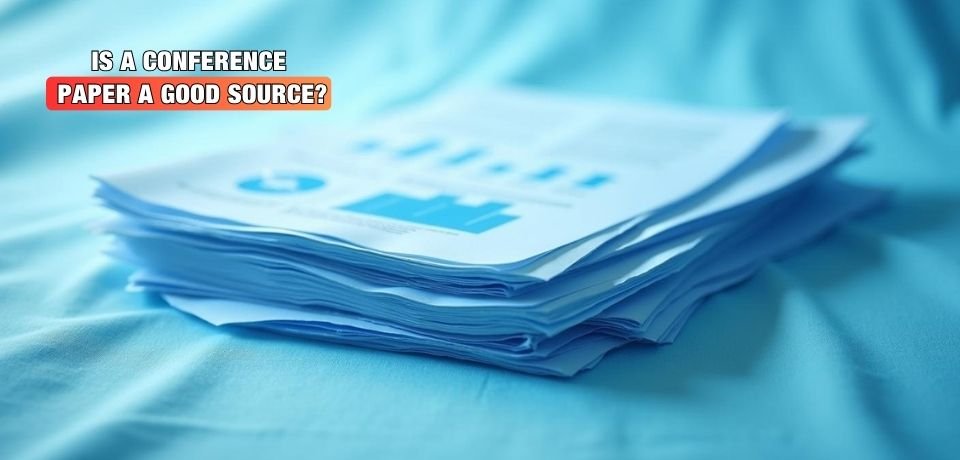Today, conference papers provide early access to the latest research and future trends. These papers often offer information about the latest developments before they are published in journals. If you’re wondering, “Is a conference paper a good source?” you’re not alone in looking for clarity on this matter.
Yes, a conference paper can be a good source, particularly when you need access to the most recent research developments. These papers often present unpublished results and novel ideas that haven’t yet made it into journals. However, the quality and reliability of conference papers can vary, so you should assess them carefully.
If you’re curious about the role of conference papers in research and want to know how to use them, read this article. You’ll find detailed information and valuable insights that will help you make informed decisions about using conference papers in your research.
Conference Paper: What is It?
A conference paper is a scholarly document presented at an academic or professional conference. It serves as a platform for researchers to share their latest findings, theories, or advancements with peers in their field. These papers often go through a selection process before being accepted for presentation, ensuring that the content is relevant and of high quality.

Typically, a conference paper is shorter than a full journal article, focusing on specific aspects of a research project. It is designed to provoke discussion, provide new perspectives, or explore upcoming trends within a particular discipline. The format and content are usually made to fit the conference’s theme and audience.
When it comes to writing an effective business conference paper, the focus is on presenting data and ideas that are directly applicable to business practices. This involves not only a clear and straightforward presentation of research findings but also practical recommendations that can be implemented in the business world. The effectiveness of such a paper lies in its ability to draw a connection between theory and practice.
The importance of conference papers lies in their role in spreading knowledge and connecting other professionals in their field. It offers an excellent opportunity to gain feedback and refine ideas before potentially expanding the research into a full journal article or another complete publication.
Is a Conference Paper a Good Source?
Providing the latest insights into current studies, conference papers are a valuable facet of academic research. They serve as a vital source of information, often presenting early results that inspire further investigation and discussion. Explore the value and considerations of conference papers in your research. More detailed information follows below.

Timeliness of Information
Conference papers often provide the most current research available. Researchers present new findings that may not yet be published in journals. This timeliness is crucial for staying informed in fast-paced fields, offering information at the front of innovation. Using these papers can keep your research aligned with the latest academic and professional developments.
Peer Review Process
The peer review process for conference papers can vary significantly between conferences. Some papers go through strict review, similar to that of journal articles, while others may face less strict review. The review process helps you assess the reliability and validity of a conference paper as a source, ensuring that it meets your research needs.
Depth of Research
Papers submitted to conferences typically focus on specific aspects of a broader study and may not cover a topic in depth. This focused approach can be a limitation but also provides detailed insights into particular areas. The depth of information in a conference paper can be highly valuable when looking for specialized knowledge or early results.
Accessibility
Conference papers are often published in conference proceedings, making them accessible to a wider audience. This accessibility promotes the sharing of knowledge and encourages collaboration among researchers. Being able to easily access conference papers can be a significant advantage, especially when exploring new or developing areas of study.
Reputation and Authority
The validity of a conference paper is often linked to the reputation of the conference and the authors’ expertise. Papers presented at prestigious conferences by recognized experts are likely to be more authoritative. This authority is crucial when considering whether to use a conference paper as a reliable source for your research.
Practical Implications
Conference papers frequently discuss the practical applications of research findings, which can be particularly useful in applied fields. These papers often translate theoretical knowledge into real-world practices, making them valuable for professionals looking to implement new strategies or technologies. The practical focus can increase the relevance of your research.
Innovativeness
It is common for conference papers to present new theories, methodologies, and ideas that push the boundaries of a discipline to the limit. Knowing how to use the conference paper format is key to effectively reading and utilizing these innovative papers, which offer fresh perspectives and challenge existing ideas. Using innovative conference papers can add a new dimension to your research.
Utilizing conference papers as sources in your research can provide access to the latest developments and specialized insights not yet available in journals. They are a valuable resource for anyone looking to expand their knowledge and engage at the top of academic study.
When Should You Use a Conference Paper as a Source?
A conference paper offers fresh insights and early results that are valuable in academic research. They often present the latest developments in a field, making them a crucial source of staying updated. You can improve your research depth and relevance by knowing when to use these papers. More detailed information follows.

Early-Stage Research
Papers you submit to conferences are ideal when you’re just beginning to explore a topic. They often contain the newest ideas and new trends that have not yet been published in journals. Using these papers can provide a strong foundation for your research, guiding your exploration of new or less developed areas.
Specialized Topics
When researching specialized or particular topics, conference papers can be incredibly useful. These papers frequently focus on specific aspects of a broader subject, offering detailed insights that might not be available in general publications. This specificity makes them a valuable resource for in-depth study of particular topics in your field.
The Latest Technologies and Innovations
Conference papers are often at the front of technological advancements and innovations. Researchers use conferences to share the latest developments, making these papers essential for gaining insight into the latest technologies and methodologies. They provide access to the latest research that might not yet be available elsewhere.
Adding Value to Journal Articles
While journal articles are often more detailed, conference papers can complement them by offering additional perspectives or new results. This combination of sources can provide a more complete view of the research environment, helping to fill gaps or improve your knowledge of a particular topic.
When Speed Is Crucial
In fast-moving fields where new information quickly becomes outdated, conference papers can be invaluable. They often report on research that is still in progress, providing timely insights that help keep your work relevant. Using these papers ensures that your research is aligned with the most current knowledge available.
By carefully selecting and applying conference papers to your research, you can increase the depth and breadth of your study, ensuring that it reflects the latest developments in your field.
Tips for Using Conference Papers Effectively in Your Research
The quality of your research can be greatly improved by effectively utilizing conference papers. As a valuable resource, these papers provide information and developments in many fields. Below are some practical tips to help you maximize the benefits of conference papers in your research.
- Identify Reputable Conferences: Focus on papers from recognized conferences, as they are more likely to be credible and reliable sources of information.
- Check the Paper’s Peer-Review Status: Ensure that the conference paper has gone through a peer-review process, which adds to its validity and academic value.
- Use Conference Papers for Current Information: Make use of conference papers to access the latest research and trends that may not yet be published in journals.
- Supplement with Other Sources: Combine findings from conference papers with other scholarly sources to create a well-rounded foundation for your research.
- Focus on Relevant Sections: Read the most relevant parts of the conference paper, such as the abstract, methodology, and conclusion, to quickly gather useful information.
- Pay Attention to Citations: Use the references in conference papers to discover additional valuable sources that can further inform your research.
- Track Emerging Trends: Keep your research up-to-date by reading conference papers to stay informed about emerging trends and new methodologies.
By following these tips, you can effectively incorporate conference papers into your research, ensuring that you benefit from the most current and relevant insights available. Utilizing these papers strategically will enhance your academic work’s depth and quality.
FAQs about Is a Conference Paper a Good Source
Conference papers can be an essential resource in academic research, offering early insights into new fields and the latest developments. Below are some frequently asked questions that delve into the role and effectiveness of using conference papers as sources.
How Do Conference Papers Compare to Journal Articles in Research?
A conference paper typically presents early findings, while a journal article provides a more detailed overview of a topic. However, the timely nature of conference papers can offer access to the latest developments in a field, making them valuable for innovative research.
Can Conference Papers Be Trusted for Accurate Data?
While conference papers often present the latest research, assess their credibility. Look at the reputation of the conference and the peer-review process involved. Papers from reputable conferences with strict review processes are generally reliable for accurate data.
What Are the Benefits of Using Conference Papers in Fast-Moving Fields?
In fast-developing fields, conference papers are invaluable as they often present the latest advancements before they appear in journals. They allow researchers to stay current with new trends, technologies, and methodologies, providing a critical edge in rapidly advancing disciplines.
Is a Conference Paper Suitable for Literature Reviews?
It is often appropriate to review literature through conference papers, especially if they cover new topics that are still unexplored in journal articles. They provide a snapshot of current research trends and can highlight gaps in the literature that need further investigation.
How Can I Identify High-Quality Conference Papers?
Consider the conference’s reputation, the author’s expertise, and whether the paper has been peer-reviewed when selecting the best conference papers. Papers presented at well-established conferences by recognized experts are more likely to be reliable and valuable for your research.
Bottom Line
A conference paper can provide timely and relevant information for your research, so they are a valuable resource for your research. They provide access to the latest developments and new trends, making them particularly useful in fast-evolving fields. So, is a conference paper a good source? Yes, especially when you need current insights that might not yet be available in journals.
When incorporating conference papers into your research, remember to analyze their reliability, supplement them with other sources, and concentrate on the most relevant sections. By using these papers strategically, you can improve the quality of your work. Best wishes as you continue your research process with these valuable tools.